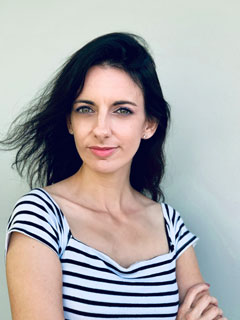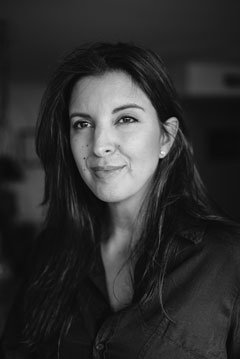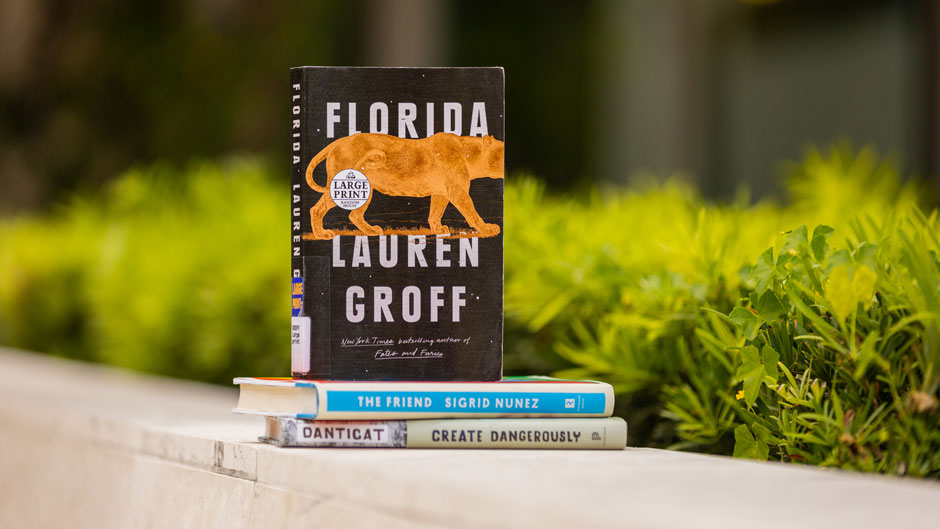The song says, “Summertime, and the livin’ is easy.” For many, the hot months ahead provide plenty of time for vacation, relaxation, and lazy hours spent by the pool, the beach or a nice airy porch. What better time to spend with a good book.
Where do we find the right summer reads? Some of our most well read professors in the Department of English and the Creative Writing Program in the University of Miami College of Arts and Sciences, weigh in. Here is what they had to say.
Chantel Acevedo, author, associate professor of English:

“Create Dangerously: The Immigrant Artist at Work” by Edwidge Danticat. In this collection of essays, Danticat, a MacArthur Genius fellow, examines what it means to be an immigrant artist in a time of global chaos. The 10th anniversary of the earthquake in Haiti is coming up in 2020, and Danticat’s work reminds us all there is still much left to do to combat suffering and poverty, both in Haiti and elsewhere. Danticat will be coming to campus in the spring of 2020 as part of the One Book, One U program.
“The Friend” by Sigrid Nuñez. This novel, winner of the National Book Award, is a poignant story about a woman, and a Great Dane she befriends in a season of grief. But it’s also about friendship and loyalty. It’s a charming story from one of the best writers in the U.S. Plus, she’ll be coming to campus, too, in spring 2020 for the Ibis Reading Series.
“A Summer with Montaigne” by Antoine Compagnon. In this newly released work of nonfiction, Compagnon takes readers on a casual stroll through the work of Michel de Montaigne, who, through his “Essays,” brought philosophy and humanities to the reading public in an accessible format. Montaigne was as relevant in the 16th century as he is today, and Compagnon’s warm and lively walk-through of these ideas is a pleasure.
Timothy P. Watson, professor and chair, Department of English:

“Washington Black” by Esi Edugyan. A strange and wonderful historical novel about a young man, George Washington Black, a gifted artist and observer of the world, who begins the novel as an enslaved field worker on a Barbados sugar plantation in the early 1830s but soon takes off—literally—for other adventures, as he and a visiting English relative of the tyrannical plantation owner create, build, and escape in a flying machine. Black’s subsequent travels take him to the Arctic and Nova Scotia, and eventually to London and an ambiguous romance with an Englishwoman, Tanna. With slavery, igloos, undersea diving, scientific illustration, and aquarium-building, this is a novel that constantly surprises you.
“Florida” by Lauren Groff. A haunting, beautiful collection of short stories that allows us to see the Sunshine State through new eyes. There are Florida-specific dramas in “Florida”—a hurricane (in “Eyewall”), panthers (“The Midnight Zone”), alligators (“At the Round Earth’s Imagined Corners”)—but they are matched by the intricate dramas of domestic life for the women narrators and protagonists of Groff’s stories. Lyrical episodes happen unexpectedly: a woman home alone at Halloween, while her husband and children are out trick-or-treating, steps out into a rainstorm and contemplates a small sinkhole in her garden as if it were a kind of subtropical Walden Pond.
“Citizen: An American Lyric” by Claudia Rankine. According to a recent study by the National Endowment for the Arts, more and more people are reading poetry, especially young people—the percentage of readers 18-24 reporting they read poetry doubled between 2012 and 2017. Claudia Rankine’s “Citizen” is an important book in this new golden age of poetry. It doesn’t look like a traditional work of poetry: it mixes prose and verse, it includes photographs and artworks, and it addresses some of the key issues of our contemporary moment: police killings of young black men; race, racism, and micro aggressions; immigration and national belonging. The poet’s persona here, addressed consistently and unsettlingly as “you,” is a Black woman academic who, despite her relative privilege, confronts over and over again the kind of institutional racism that continues to structure American society.
Patricia Engel, author, visiting professor in Creative Writing:

“Everything Inside” by Edwidge Danticat. For longtime fans of Haitian-American writer Danticat and for new readers alike, this collection will not disappoint, with stories that speak to the heartaches and nuances of diaspora, many of which are set in Miami.
“Good Talk” by Mira Jacob. This is a graphic memoir unlike any other, that, with dazzling clarity, confronts our present cultural and political landscape and the many difficult conversations people of color have been having with themselves and with those closest to them.
“Dominicana” by Angie Cruz. This book will be out at the beginning of September but I was lucky enough to snag an early copy and I am spellbound by the language and story. This gorgeously written and riveting book is one that everyone should pre-order to dig into come fall.

